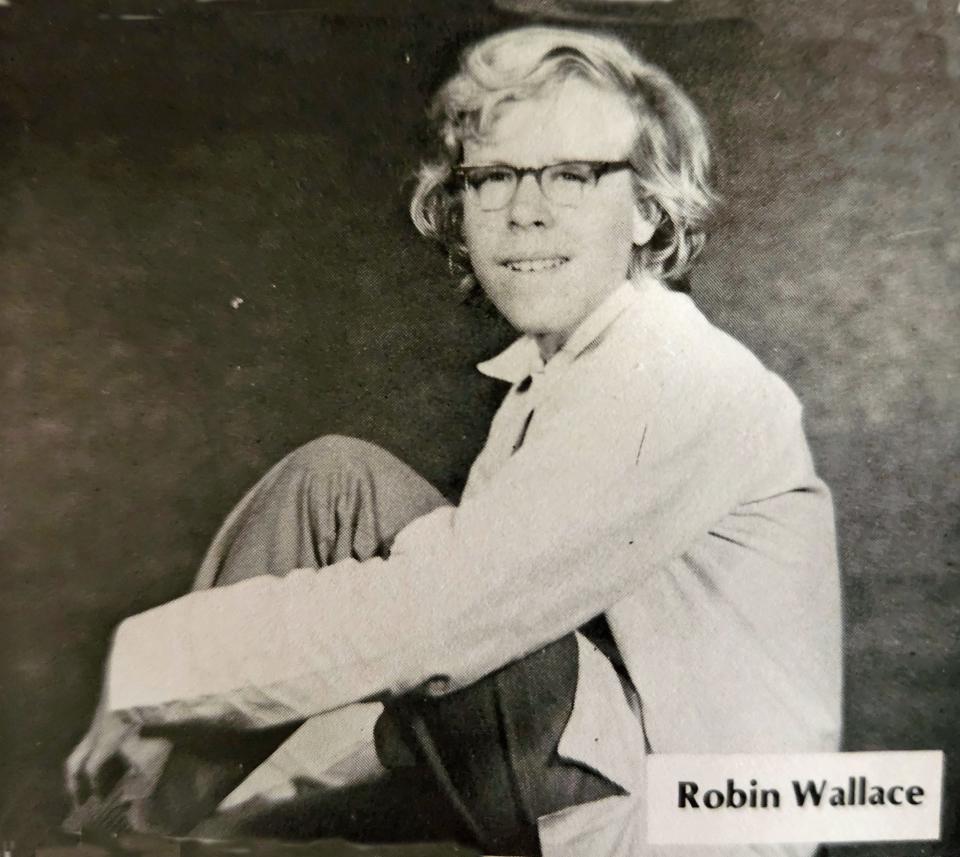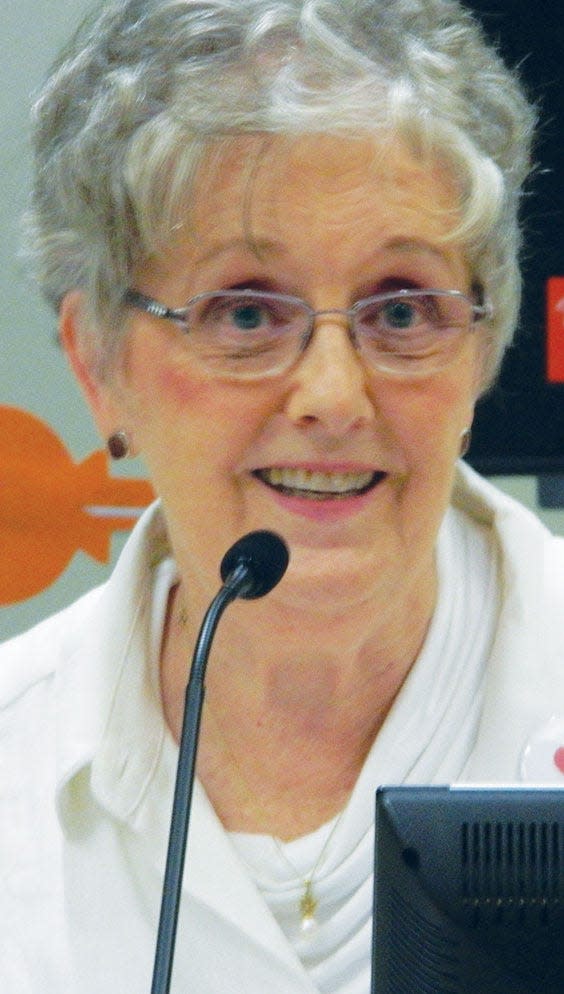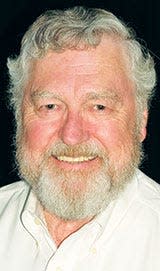The life of '73 Oak Ridge High grad Robin Wallace, Part 1
- Oops!Something went wrong.Please try again later.
Retired Oak Ridge High School teacher Benita Albert brings us the story of Robin Wallace, yet another distinguished graduate of Oak Ridge schools. His achievements in music and writing will bring you joy to understand how he went from a teenager who was bullied and suffered from low self-esteem to an accomplished artist and author.
Enjoy Benita’s most recent work toward a book she plans to publish soon!
***

The Oak Ridge High School Class of 1973 celebrated its 50th class reunion in October 2023. I was delighted to be invited to reconnect with former students and to catch up on their lives since ORHS. I learned that this multi-talented group of students has since distinguished themselves across a broad range of careers and accomplishments. Reuniting with Robin Wallace, my former Advanced Placement (AP) Calculus student, I quickly knew that I wanted to write his story.
Robin E. Wallace (ORHS ’73) is a Yale University graduate who earned a Ph.D. in music history in 1984. His dissertation, “Contemporaneous Criticism of Beethoven: A Case Study in Musical Aesthetics,” was the launchpad for numerous later publications and presentations on his primary musical influencer, Ludwig van Beethoven. His first book, “Beethoven’s Critics: Aesthetic Dilemmas and Resolutions During the Composer’s Lifetime,” (Cambridge University Press) was published in 1986. As proof of its value, the book has been frequently cited by authors in numerous scholarly publications on Beethoven.
Robin has been a professor of musicology at Baylor University for two decades. He is an excellent writer, his most recent book, “Hearing Beethoven: A Story of Musical Loss and Discovery,” (University of Chicago Press, 2018) has received praise across musical and disability-studies communities.
I remembered Robin as a talented mathematics student in the selective courses of Math Analysis and AP Calculus at ORHS. I also remembered Robin’s interest in music, not a surprising combination in that research has shown that music activates the same areas of the brain as mathematical problem solving.
His passion for music, inculcated from early arts experiences, has combined with writing and teaching to define his professional career. Some of the motivators for this combination of interests come from Robin’s childhood through early adult experiences, and that will be shared in this part of a two-part story.
Robin attended Oak Ridge Schools for grades K-12, except third grade when his father accepted a post-doctoral appointment in Canada. His father, Robin A. Wallace, came to the Oak Ridge National Laboratory (ORNL) in 1960 for a three-year, post-doctoral appointment, followed by the year in Canada. He then returned as a research scientist in the ORNL Biology Division. Son Robin wrote, “My dad performed field-defining research in vitellogenesis: the synthesis of egg yolk protein. The family spent summers on Cape Cod where dad worked at the Marine Biological Laboratory in Woods Hole, MA.”
His parents, both from New York City, met during their work as summer camp counselors. By her undergraduate senior year, Robin’s mother, Janet, transferred from Oberlin College, to complete an undergraduate degree from Barnard College and to marry Robin A. Wallace who completed his Ph.D. program from Columbia University in 1960.
The family’s 1960 move to Oak Ridge was with a rising kindergartner, Robin, and younger brother Jon (ORHS Class of ’76). Janet completed a Ph.D. in psychology from the University of Tennessee, and she worked in Knoxville as a clinical psychologist for more than three decades.
After Robin’s parents divorced in the early 1980s, his father left ORNL to work at the Whitney Marine Laboratory in Florida. He is now retired and living in Florida. Janet moved to a retirement community in Pennsylvania in 2008 where she still lives. Robin’s brother, Jon, works as a senior writer and editor for the Graduate School of Education at Harvard University.
Robin’s memories of his Oak Ridge Schools education include high praise for a sequence of strong mathematics teachers from accelerated Algebra 1 in eighth grade at Robertsville Junior High School (RJHS) through the highest course offerings at ORHS. His praise continued for social studies with Canton Napier at RJHS, and at ORHS for: history with Eugene Pickel, English with Christine Lenihan and Bill Countess, and French with Sylvia Countess. His love of music was encouraged and valued under the tutelage of eighth grade, RJHS music teacher Ardyce Lee and in a senior-year course, Music Theory and Harmony, under legendary ORHS Band Director Steve "Doc" Combs.
Sadly, Robin also recalled his early summer camp social challenges and turbulent junior high years where his grade performance plummeted and where his confidence and self-esteem suffered from relentless bullying by certain of his peers. He felt intimidated and hopeless, as well as voiceless in his and his parents’ attempts to seek administrative intervention and support.
Robin described his young self as small of stature, nonathletic, and socially confused. He found it difficult to share the peer-taunting incidents with his parents and other authority figures, turning inward with self-blame and manifesting his rebellion in poor academic performance. He relived his emotional trauma and personal chagrin in a recent reflective writing: “Countless adults tell me, ‘Just don’t let them see that it bothers you’… others tell me to fight back. But even at this early age, I am a practicing pacifist. I don’t WANT to fight back.”
Robin’s reflections on peer pressure are very much a part of the person he became: still a pacifist, an advocate for the disabled, and a listener and empathizer. Also, he is a respected academician with an impressive resume’ of creative and scholarly accomplishments.
Robin found solace in the musical ardency he was developing. At age nine he began private piano lessons with Milka Choset, the wife of Oak Ridge Symphony conductor Frank Choset. After the Choset family moved to Israel in 1969, Robin studied under Patricia Staffel Carter, a University of Tennessee faculty member. During high school, Robin auditioned and was selected for two summers of study at the Sewanee (University of the South) Summer Music Center, a five-week residential program.
Hearing his Sewanee summer peers perform symphonies by Mahler and Beethoven, Robin said: “I quickly fell in love with the late Beethoven quartets and piano sonatas which are considered some of his most difficult works, but which I understood intuitively and at once.”
His future was evolving, he felt drawn to follow the aspirations of many family members who had earned Ph.D.s. A notable role model was his great uncle, Charles Hughes, a professor of musicology at Hunter College in New York City. And given that many visiting faculty at the Sewanee Music Camp came from Oberlin College, Robin made it a first choice for his undergraduate studies. Surely, his Oberlin acceptance status had an extra competitive edge due to local symphony concert reviews that Robin wrote for The Oak Ridger during his senior year at ORHS. Robin continued his journalistic leanings, devoting extracurricular time in writing for the student newspaper, The Oberlin Review. He eventually was appointed one of the newspaper’s managing editors.
When Robin responded to my question on his teenage aspirations, he put it this way: “I always envisioned myself as a teacher.” He further explained that beginning with his junior high years he was motivated to teach at that level, where he felt he could be an empathetic advocate for students suffering from peer harassment and low self-esteem. As his educational program progressed, he wrote: “By the time I got to high school, I wanted to teach high school, and by college, I wanted to teach college. The only other career I seriously considered was journalism.” He summarized his answer by saying that all his interests were melded into his decision to write his doctoral dissertation on music criticism (of Beethoven) and to seek a university teaching appointment in musicology.
Robin described his dissertation completed under the advisement of Leon Plantinga, a Yale University expert on music of the later 18th and the 19th centuries.
"My dissertation focused on the critical reception of Beethoven’s music during his lifetime. Beethoven had long been my favorite composer. I wanted to write about how his music spoke to the emotions in uniquely powerful ways, but at that time music’s emotional content was widely considered too vague and subjective to be a proper subject for scholarly study. So, I did the next best thing and wrote about early critics who had spoken freely about this aspect of Beethoven’s music.”
During Yale graduate studies, Robin was selected for a coveted Prize Teaching Fellowship to cultivate his teaching skills and interests. The Fellowship recipients were asked to develop and teach two courses of their own design.
Robin said, “I created a course on the music of Haydn for non-music majors and one on opera in the late 19th century for music majors. This led to my being asked to teach through three more semesters as an adjunct faculty member.”
The experience impassioned him to further pursue the teaching of introductory music to non-majors, a course commonly known as music appreciation. The course at Yale used an old, out-of-print text that Robin admired.
He said, “(The text) avoided the usual chronological survey in favor of an intense concentration on listening skills.”
Robin continued, “When I started teaching that course at California State Long Beach - my first teaching job after Yale - I found that there was no longer any book in print with that approach, and I resolved to eventually write one myself.” His book, “Take Note: An Introduction to Music Through Listening,” was published by Oxford University Press in 2014.
Over his career, Robin has checked off many of his young dreams, namely by combining his passion for music with writing and teaching. He has authored four books with a fifth in production and has numerous online, open-access research posts.
More of Robin’s life journey will follow in a second installment of his story. His book, “Hearing Beethoven,” is a compelling read for music devotees of Beethoven and for others interested in the fields of psychology, music perception, disability studies, sound studies, and neuroscience. These fields, as noted by Robin in the acknowledgements section of the book, provided a rich interdisciplinary setting for discussion based on his late wife’s late-in-life struggles with deafness, and likewise, Beethoven’s similar challenges.

In the book’s introduction, Robin wrote: “This is a story no one else could tell. I hope my telling it will be ear-opening for anyone intrigued by the human heart, the human mind, and the mysterious harmony that binds them together.”
***
Thank you, Benita. Robin sure rose to great heights as a teacher extraordinaire. Next we will learn about Robin’s recent life and accomplishments.
D. Ray Smith is the city of Oak Ridge historian. His "Historically Speaking" columns are published each week in The Oak Ridger.

This article originally appeared on Oakridger: The life of '73 Oak Ridge High grad Robin Wallace, Part 1

